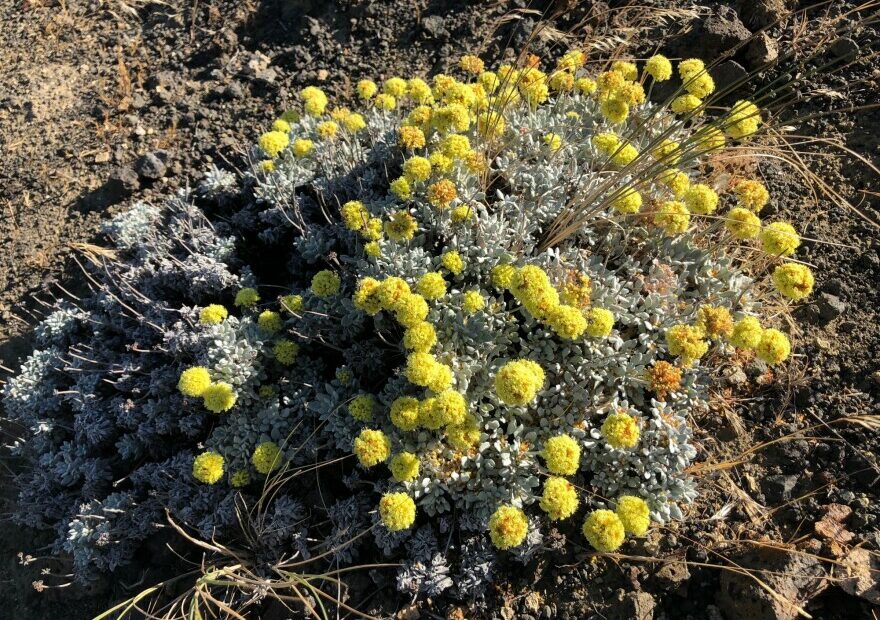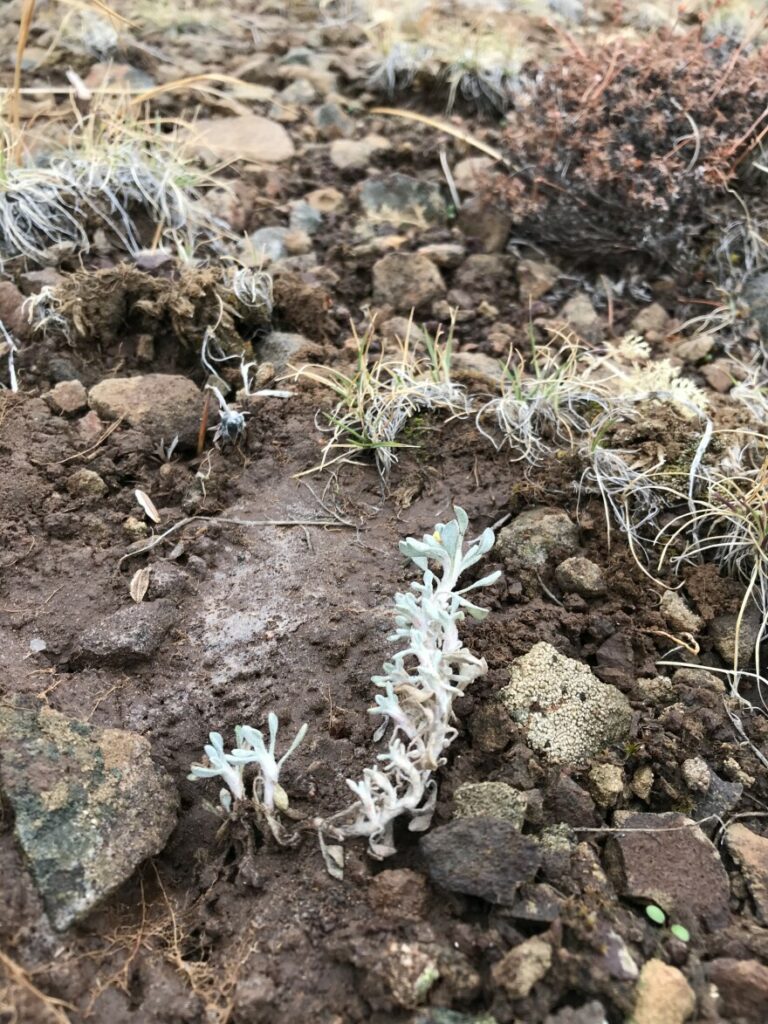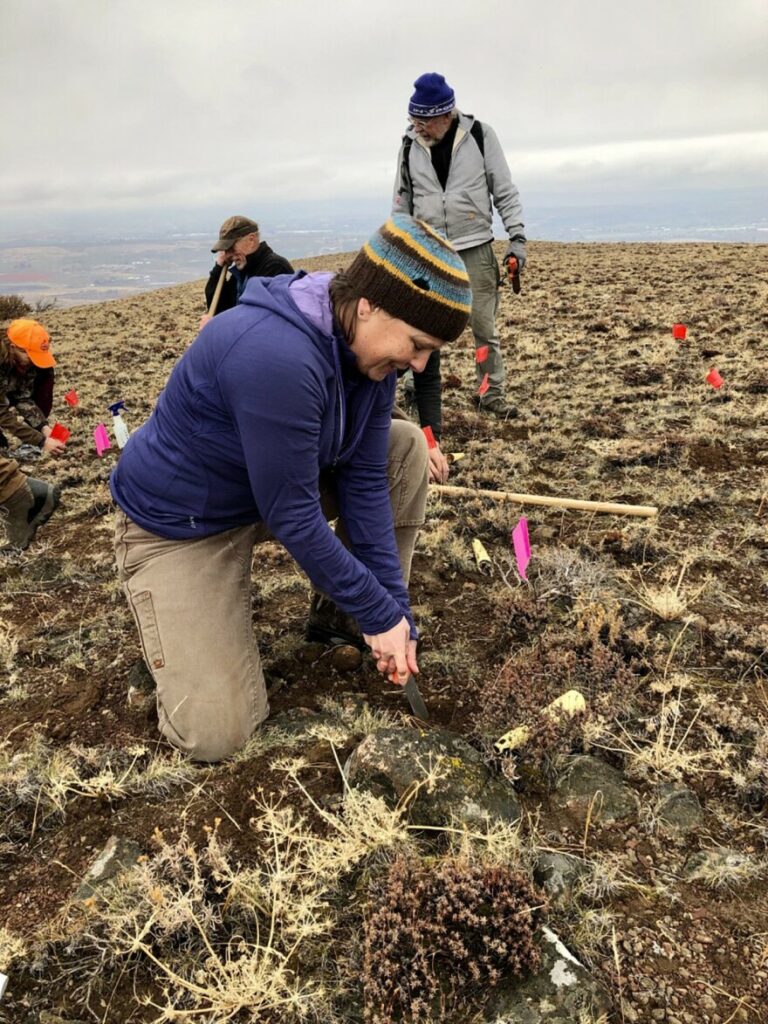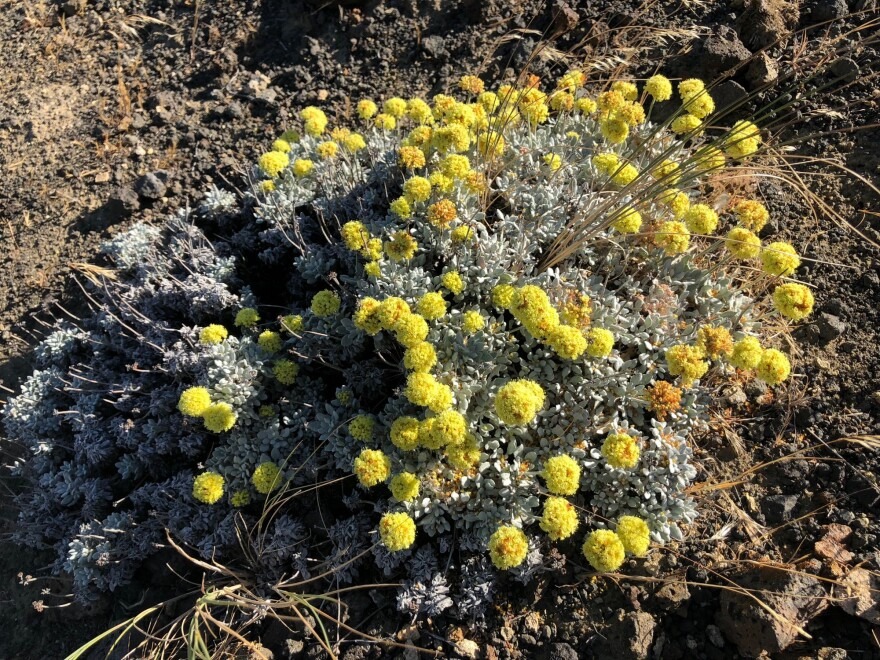
New Hope For A Rare Plant At Hanford Reach
Read
Wildfires, invasive species and climate change are seriously threatening the Hanford Reach National Monument, and with it, a rare plant that grows only in one place in the world.
This winter, a team of plant researchers is giving the Umtanum desert buckwheat new hope. Researchers and volunteers planted a second outcropping at the Cowiche Canyon Conservancy near Yakima.
Successfully growing more plantings of Umtanum desert buckwheat is critical to the survival of the threatened plant, said Tara Callaway, Washington State Recovery coordinator for the U.S. Fish and Wildlife Service.
“We literally have all of our eggs in one basket in that one spot,” Callaway said.
In 2017, the Silver Dollar Fire burned at least half of all the Umtanum desert buckwheat at Hanford Reach.
The increasing frequency and severity of wildfires in the area are particularly concerning, Callaway said. A single fire could wipe out the only Umtanum desert buckwheat in the world.
In addition, invasive species, such as cheatgrass, crowd out the Umtanum desert buckwheat. Climate change also will shrink its habitat.
“By having a second population, it provides some assurance that if disaster strikes in the form of wildfire or invasive species, the species as a whole may still persist,” Callaway said.
A lot of work went into giving the plant a head start.
[story continues below image]

A newly planted Umtanum desert buckwheat seedling at Cowiche Canyon Conservancy.
Photo courtesy of T. Callaway/USFWS Photo
Instead of planting seeds straight into the ground, the University of Washington Botanic Gardens Rare Care Program first grew the seeds into seedlings.
“We let them sit for weeks and see what combination of time, temperature and light will produce the best germination of the seed,” said Wendy Gibble, Rare Care Program manager.
Then, researchers tested different soil mixes and containers to see how the plants continued to grow best.
Moreover, east of the Cascades, the program has helped a variety of rare and threatened plants, including the White Bluffs bladderpod at Hanford Reach, the Wenatchee Mountains checkermallow, and the showy stickseed, near Leavenworth, Gibble said.
Rare plants often make up an important part of a diverse, healthy ecosystem, Gibble said.
For example, the Umtanum desert buckwheat blooms in the middle of summer, when most other plants no longer bloom, Gibble said.
“What pollinators and insects is this species supporting, through a period of the summer that’s incredibly harsh with not a lot of other nectar sources?” she said.
Rare plant species often have these types of niche purposes within an ecosystem, Gibble said.
Callaway said of the blossoms, “It’s beautiful when you stand up on the ridge at Hanford Reach, and you can see these clusters of all yellow.”
Researchers also hope the plantings will provide those unique summer blossoms at the Cowiche Canyon Conservancy.
[story continues below image]

Emily Orling, a biologist with the U.S. Fish and Wildlife Service, plants Umtanum desert buckwheat at the Cowiche Canyon Conservancy. Photo courtesy of T. Callaway/USFWS Photo
Over two cold and foggy days this winter, a group of volunteers hiked along the canyon.
Researchers planted the 246 seedlings of Umtanum desert buckwheat at a slightly higher elevation, which will hopefully protect this group of plants from climate change, Callaway said.
“We’re hoping that at this particular site it will have a little bit more moisture and will also have cooler temperatures,” Callaway said.
The volunteers dug into the rare, rocky soil. The group planted the seedlings into three different plots, Callaway said.
Although earlier attempts to plant Umtanum desert buckwheat were unsuccessful, Callaway said she hopes plants in this area eventually will survive. In earlier attempts, the soil was too rocky, she said. Wildfires also burned the area right after the plantings.
Establishing these new seedlings at the conservancy may take several years and multiple tries, but researchers have to be tenacious, Gibble said.
This spring, researchers will head back to the area to see if the plants survived the winter.
The U.S. Fish and Wildlife Service and volunteers with the Cowiche Canyon Conservancy will continue to water the plants and watch as the Umtanum desert buckwheat grows, Callaway said.
The Cowiche Canyon Conservancy owns the land where the Umtanum desert buckwheat seedlings were planted.
Umtanum desert buckwheat can grow for more than 100 years, Callaway said. In the last 20 years, Callaway said new seedlings in study areas at Hanford Reach haven’t survived until adulthood, around when the plants reach five years old.
Researchers said they aren’t sure why the seeds haven’t grown successfully. Callaway said it could be that the young plants need perfect conditions to survive.
Meanwhile, the Rare Care Program is growing more Umtanum desert buckwheat seedlings, Gibble said. The group plans to plant this batch of seedlings at Hanford Reach this fall.
“These are pretty harsh conditions where this plant lives,” Gibble said. “Sometimes you have a lot of success with some species, and with some species you have a lot of failure. You just have to keep on plugging away at it.”
Related Stories:

Seattle Veterans Affairs staffer alleges whistleblower retaliation
A staffer for the Veterans Affairs Puget Sound Health Care System has alleged retaliation after he spoke out about the deteriorating conditions of a building on the south Seattle campus that housed specialty clinics and office space.
Douglas Galuszka, chief of logistics, was issued two suspensions totaling three weeks of unpaid leave this year. He said VA administrators punished him for calling attention to leadership failures at the hospital and talking with press. According to Galuszka, the two suspensions he served mark the only discipline he has received in his seven years working for the VA. Prior to the suspensions, Galuszka said, he was not counseled by a supervisor or required to go through training.

What is Initiative 2109?
Listen I-2109 would repeal the capital gains tax, which helps fund child care and schools. (Credit: Flickr Creative Commons / Kids’ Work Chicago Daycare) (Runtime :56) Read In NWPB’s recent

What is Initiative 2124?
A resident makes his way to the dining room for lunch at a nursing home on March 6, 2020. (Credit: David Goldman / AP Photo) Listen (Runtime :53) Read In













